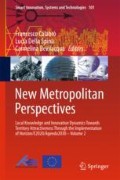Abstract
The idea underpinning EIP-AGRI for linking producers and users of knowledge and promoting their interaction around problem-solving is well grounded on the evidence provided by the ‘innovation systems’ and related literature. Evidence gaps that matter to the implementation of the EIP-AGRI activities comprise the lack of knowledge regarding the best-fit network configuration for different farming systems and farming styles, and the nature and effectiveness of a facilitator function and role to bridge communication between researchers and farmers. This paper contributes with empirical evidence regarding the networks configuration best-fit for different farming system and farming styles, and provide insights on the facilitator relevance and its desirable profile, built on the study of a particular network: the Portuguese Cluster of small fruits (CSF). The small fruit sector is a novel sector in Portugal that has attracted in recent years a large number of new investors, in particular newly-established small-scale inexperienced producers. The insights provided by the CSF analysis emphasises that agglomeration economies based networks, which are very important in some agricultural sectors (e.g. fruit, wine) and in countries or regions where small-scale farms are significant, can in fact be the ground for knowledge and innovation networks in the sense wanted by the EIP-AGRI, since inclusiveness and facilitation functions are accounted for properly.
Access this chapter
Tax calculation will be finalised at checkout
Purchases are for personal use only
Notes
- 1.
PRO-AKIS (Prospects for Farmers’ Support: Advisory Services in European AKIS. Additional information available at http://www.proakis.eu/).
- 2.
To fully understand the social network analysis reported we suggest readers to see [17].
References
Commission of the European Communities (CEC), State of the Innovation Union 2012 - Accelerating change. Commission of the European Communities, Brussels, COM (2013), 149 final (2013)
EU SCAR, Agricultural knowledge and innovation systems towards 2020 - an orientation paper on linking innovation and research, Brussels (2013)
Asheim, B.: Interactive learning and localised knowledge in globalising learning economies. Geo J. 49, 345–352 (1999)
Audretsch, D.: Agglomeration and the location of innovative activity. Oxf. Rev. Econ. Policy 14, 18–29 (1998)
Cooke, P., Uranga, M., Etxebarria, G.: Regional innovation systems: institutional and organisational dimension. J. Res. Pol. 26, 475–491 (1997)
Lundvall, B.: National Innovation Systems: A Comparative Analysis. Oxford University Press, Oxford (1992)
Hall, A.: Challenges to strengthening agricultural innovation systems: where do we go from here? In: Scoones, I., Thompson, J. (eds.) Farmer First Revisited: Innovation for Agricultural Research and Development. Practical Action Publishing, Rugby (2009)
Klerkx, L., Leeuwis, C.: Matching demand and supply in the agricultural knowledge infrastructure: experiences with innovation intermediaries. Food Policy 33, 260–276 (2008)
Pittaway, L., Robertson, M., Munir, K., Denyer, D., Neely, A.: Networking and innovation: a systematic review of the evidence. Int. J. Manag. Rev. 5–6(3–4), 137–168 (2004)
Ritter, T., Gemuenden, H.: Interorganizational relationships and networks: an overview. J. Bus. Res. 56, 691–697 (2003)
Oreszczyn, S., Lane, A., Carr, S.: The role of networks of practice and webs of influencers on farmers’ engagement with and learning about agricultural innovations. J. Rural Stud. 26, 404–417 (2010)
Wood, B.A., Blair, H.T., Gray, D.I., Kemp, P.D., Kenyon, P.R., Morris, S.T., Sewell, A.M.: Agricultural science in the wild: a social network analysis of farmer knowledge. PLoS ONE 9(8), e105203 (2014)
Conroy, C.: The nature of agricultural innovation. In: Snapp, S., Pound, B. (eds.) Agricultural Systems: Agroecology and Rural Innovation for Development. Academic Press, San Diego (2008)
Klerkx, L., Aarts, N., Leeuwis, C.: Adaptive management in agricultural innovation systems: the interactions between innovation networks and their environment. Agr. Sys. 103, 390–400 (2010)
Porter, M.E.: Location, competition, and economic development: local clusters in a global economy. Econ. Dev. Q. 14, 15–34 (2000)
Giuliani, E., Bell, M.: The micro-determinants of meso-level learning and innovation: evidence from a Chilean wine cluster. Res. Policy 34, 47–68 (2005)
Hanneman, R.A., Riddle, M.: Introduction to Social Network Methods. University of California, Riverside (2005)
Madureira, L., Ferreira, D., Pires, M.: Designing, implementing and maintaining (rural) innovation networks to enhance farmers’ ability to innovate in cooperation with other rural actors. The berry networks in Portugal. Report for AKIS on the ground: focusing knowledge flow systems (WP4) of the PRO AKIS project, December 2014 (2014)
Nooteboom, B.: Institutions and forms of coordination in innovation systems. Org. Stud. 21, 915–939 (2000)
Knierim, A., Boenning, K., Caggiano, M., Cristóvão, A., Dirimanova, V., Koehnen, T., Labarthe, P., Prager, K.: The AKIS concept and its relevance in selected EU member states. Outlook Agr. 44, 29–36 (2015)
Acknowledgments
We acknowledge funding from the European Commission, 7th Framework Programme through the project PRO AKIS (Prospects for Farmers’ Support: Advisory Services in European AKIS, http://www.proakis.eu/). This work does not necessarily reflect the view of the European Union and in no way anticipates the Commission’s future policy in this area.
Author information
Authors and Affiliations
Corresponding author
Editor information
Editors and Affiliations
Rights and permissions
Copyright information
© 2019 Springer International Publishing AG, part of Springer Nature
About this paper
Cite this paper
Madureira, L., Cristóvão, A., Ferreira, D., Koehnen, T. (2019). Actors, Roles and Interactions in Agricultural Innovation Networks: The Case of the Portuguese Cluster of Small Fruits. In: Calabrò, F., Della Spina, L., Bevilacqua, C. (eds) New Metropolitan Perspectives. ISHT 2018. Smart Innovation, Systems and Technologies, vol 101. Springer, Cham. https://doi.org/10.1007/978-3-319-92102-0_5
Download citation
DOI: https://doi.org/10.1007/978-3-319-92102-0_5
Published:
Publisher Name: Springer, Cham
Print ISBN: 978-3-319-92101-3
Online ISBN: 978-3-319-92102-0
eBook Packages: Intelligent Technologies and RoboticsIntelligent Technologies and Robotics (R0)

